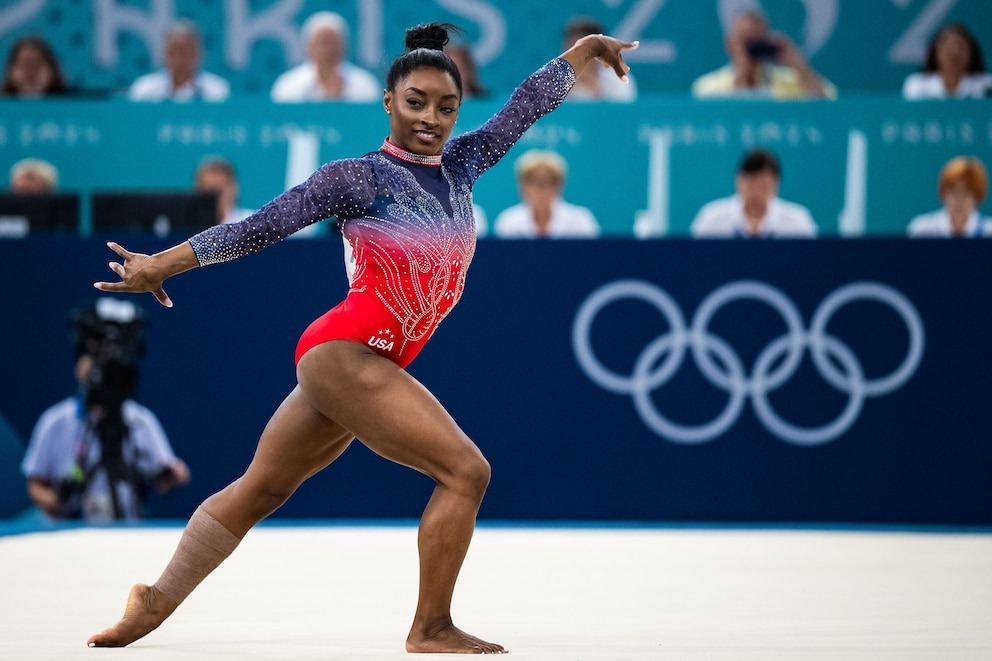
Shortly after the 2020 Tokyo Olympics, Biles appeared on The ‘Today’ Show, where she said it’s “been a relief [to speak openly about her emotions] but it’s not easy to go through it.” “Because I try to be strong not only for other people but also myself, but sometimes there are weaknesses in strength and that’s OK, and it’s OK not to be OK, and I’ve taught myself that,” the ‘Dancing With The Stars’ alum said.
“To do something that I’ve done forever and just not be able to do it because of everything I’ve gone through is really crazy because I love this sport so much,” Biles said at the time. “It’s hard. … And I don’t think people understand the magnitude of what I go through, but for so many years to go through everything that I’ve gone through having a front, I’m proud of myself.”
Simone Biles Makes Her ComebackIn 2023, at the World Championships in Antwerp, Biles made her comeback, winning five medals, including four golds. Biles admitted feeling nervous about returning to compete and felt less confident than in the past, but that didn’t seem to get in her way. In total, she has 37 World and Olympic medals. She is set to compete in the 2024 Olympics, which will take place later this year.
Mental health isn’t just a trending topic—it’s real, raw, and something even the strongest people face. And when someone as iconic as Simone Biles steps forward to say “It’s a relief to talk about it,” the world listens. Let’s dive into how Simone’s courage to speak up is changing the narrative on mental wellness, inspiring millions, and proving that strength isn’t just physical—it’s also emotional and mental.
Why Simone Biles’ Voice Matters More Than Ever
Simone Biles isn’t just a gymnast—she’s a symbol of resilience. With 32 Olympic and World Championship medals, she’s been called the greatest of all time. But her latest victory? Owning her mental health story.
The Moment That Changed Everything: Tokyo 2020
What Really Happened in Tokyo?
In the middle of the Olympic Games, Biles pulled out of several events. It shocked the world. But instead of brushing it off, she told the truth: she wasn’t mentally ready.
Mental Health Over Medals
Simone chose herself over the gold. And that decision—though controversial—sparked a global conversation that still echoes today.
The Pressure of Perfection
The Weight of Expectations
Can you imagine the pressure? Every flip, every landing, every gaze from the world watching… expecting perfection. That pressure can crush even the toughest spirits.
Being a Role Model Isn’t Always Glamorous
Being the face of an entire sport comes with emotional baggage. Simone has spoken about the loneliness, the anxiety, and the constant fear of not being “enough.”
“It’s a Relief to Talk About It” – Why These Words Matter
Breaking the Silence
When Simone said those words, she gave others permission to speak up too. Especially athletes who’ve been trained to “push through” instead of feel.
Creating Space for Honesty
Talking about mental health shouldn’t be taboo. Simone is helping normalize the conversation, and honestly? That’s more powerful than any medal.
The Ripple Effect of Her Honesty
Athletes Everywhere Speaking Out
Following Simone’s confession, others like Naomi Osaka and Michael Phelps shared their own struggles. It created a domino effect of vulnerability in the sports world.
Mental Health Is Now Front and Center
Brands, teams, and even the Olympics started integrating mental health support into their programs. This shift? It started with one voice.
Healing Isn’t Linear – And That’s Okay
There’s No Quick Fix
Mental wellness is a journey, not a destination. Simone still attends therapy, practices mindfulness, and speaks openly about her ups and downs.
Every Day Is a Step Forward
Some days are harder than others. But each day she chooses to show up authentically is another win.
Why the World Needed This Conversation
We’re All Human, After All
Even superhumans like Simone Biles face anxiety, trauma, and burnout. Her story reminds us that it’s okay not to be okay.
Mental Health Isn’t Weakness
Let’s kill that myth right now. It takes guts to admit you’re struggling. Real strength is in vulnerability.
Lessons We Can All Learn From Simone
1. Prioritize Yourself
Your well-being comes before any job, task, or expectation. Always.
2. Ask for Help Without Guilt
Therapy, support groups, or even a trusted friend—help is there if you reach for it.
3. Share Your Truth
Your story could save someone else’s life. Just like Simone’s did.

Inside Simone’s Toolbox: How She Copes
Therapy Is a Lifeline
She’s been honest about seeking therapy regularly, and how it’s helped her reframe her thoughts.
Mindfulness Practices
From journaling to meditation, she uses tools that help her stay grounded.
Setting Boundaries
She knows when to say no—something most of us are still learning to do.
Why Society Is Finally Listening
The Shift in Cultural Narratives
Celebrities and influencers are now opening up. Mental health is no longer hush-hush.
Younger Generations Are Leading the Charge
Gen Z? They’re all about emotional authenticity—and Simone is a hero in their eyes.
The Stigma Still Exists—But We’re Fighting Back
Mental Health Shaming Is Real
Despite the progress, many still fear being labeled “weak” or “dramatic.”
But Stories Like Simone’s Are Chipping Away at That Wall
Every time someone famous opens up, it breaks down another barrier.
From Athlete to Advocate: Simone’s New Role
Not Just a Gymnast
Simone is now seen as a mental health advocate, using her voice to impact far beyond sports.
She’s Partnering With Organizations
She’s working with groups to provide access to mental health resources—especially for young athletes.
The Impact on Young Girls Around the World
Representation Matters
Little girls now know they don’t have to be perfect. They just have to be real.
Strength Isn’t Always Loud
Sometimes strength is in stepping back, not charging forward.
Final Thoughts: Simone’s Courage Is a Win for Us All
Simone Biles’ decision to speak openly about her mental health wasn’t just brave—it was transformative. In a world obsessed with hustle, her story reminds us to pause, reflect, and heal.
She showed us that it’s okay to put ourselves first. That talking about your mental health isn’t a confession—it’s liberation. And in doing so, she redefined what it means to be strong.